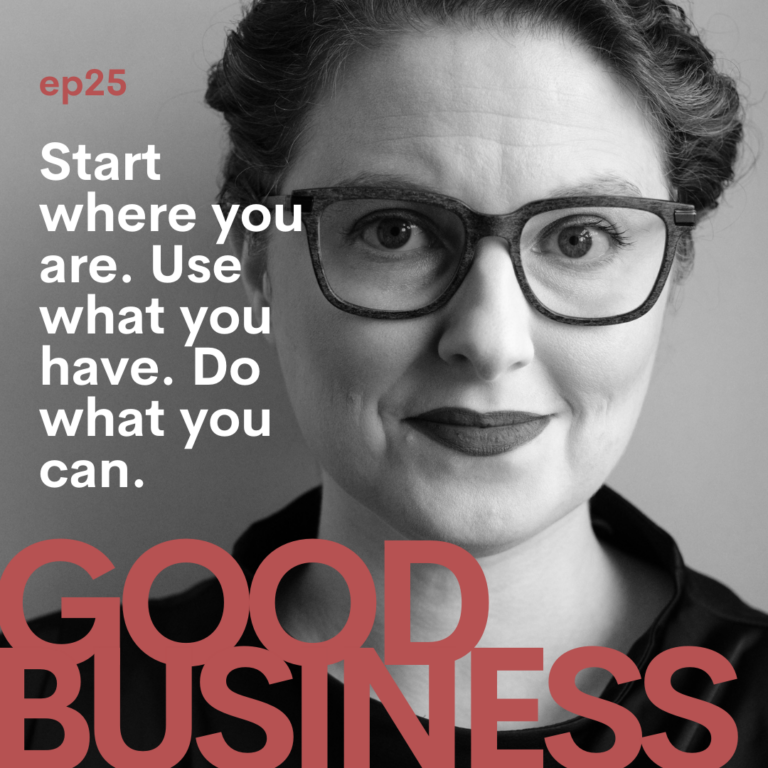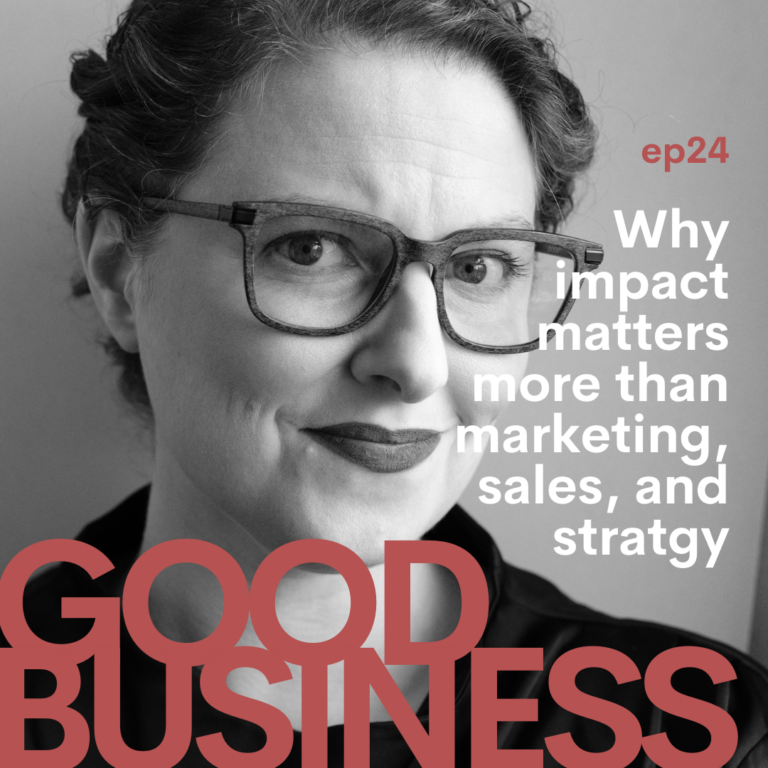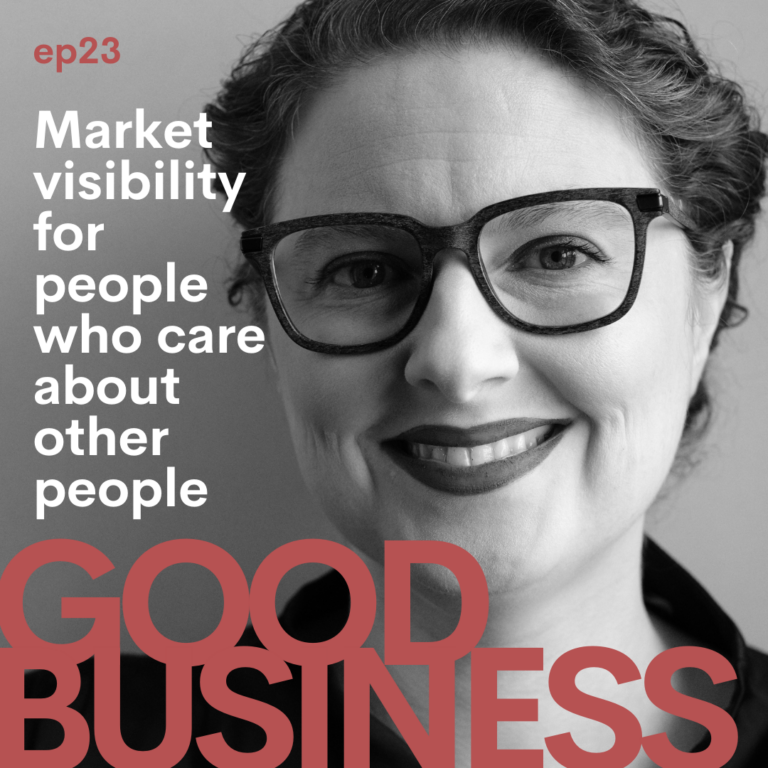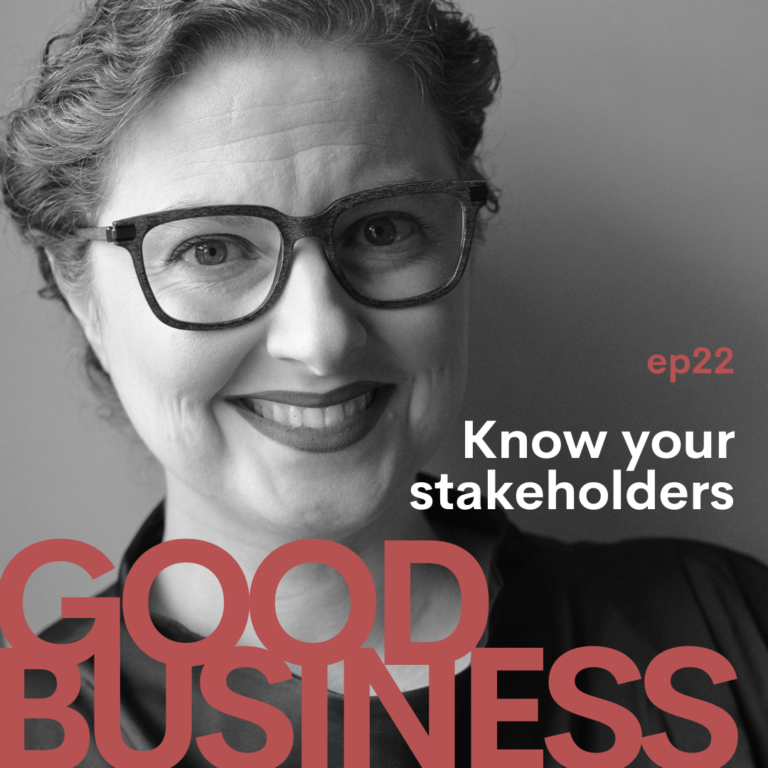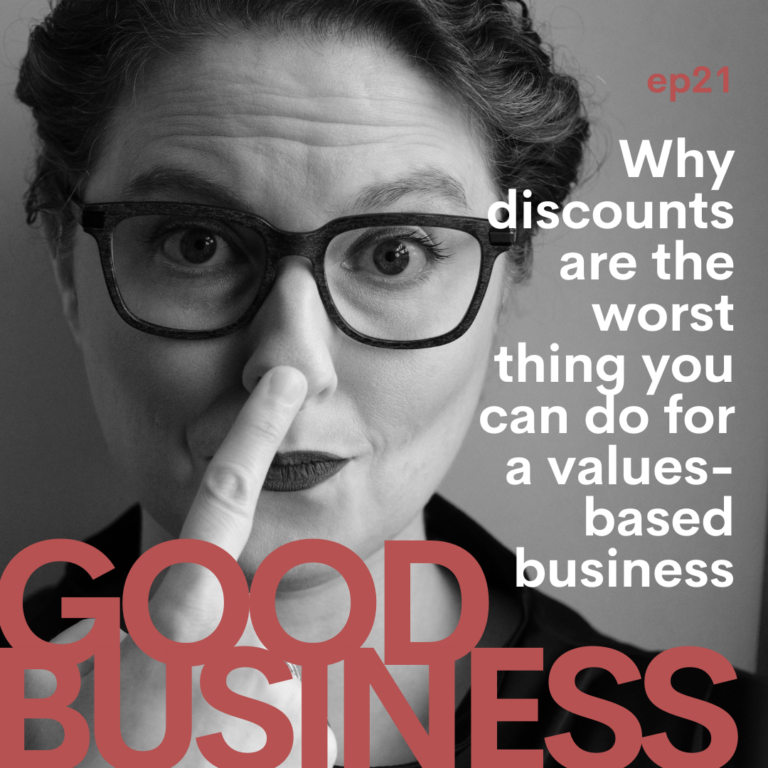Today’s episode is about identifying your leadership values. And not in a “Oh, I value honesty” version. It might not sound sexy, but it’s essential.
Episode Transcript:
Hi everybody, and welcome back to the Good Business Podcast. I’m your host, Illana Burk, and I am delighted to have you here with me today.
Today, we are talking about identifying your leadership values. Now that sounds like a really not sexy topic, that sounds painfully boring, and I wish there was a fancier, snazzier word for this, but there is not. So we’re working with what we’ve got, okay?
This is not going to be the standard like “what are your values?” And you say, “oh, honesty,” and then we move on. It’s not what we’re doing right now, okay, wouldn’t be me if we did things like other people do them. So we’re going to do this my way. First off, we’re going to articulate the need, why do you need to know what your leadership values are? Second, we’re going to talk about what leadership values even are, and then we’re going to talk about how to figure out what yours are. Alright.
First off, why is identifying your leadership values important? Well, if you don’t know what your values are, you will very likely stop having them. That’s the really, really important part I want everybody to hear me say.
If you don’t know what your leadership values are, you will eventually stop having any. That means, you’ll stop caring about other people, somewhere along the way. In very clear terms, that’s what happens. If you don’t have something that’s your touchpoint to go back to again and again and go, this is what matters to me, and this is how I’m going to behave, then when you’re in a sticky situation, you will choose selfish, every time. That is human nature, we will choose our own survival over other people. Unless we have something that reminds us that we are not the only fucking people in the world.
That’s why this is really goddamn important. Because that is human nature. Our survival instinct will kick in, in lieu of higher reasoning. What we’re doing today is a little bit of, how do you figure out what your higher reasoning is?
So next up, we’re going to talk about why most people do this wrong.
Now I have done an exercise of some variety like this with clients, for a decade. I have asked literally hundreds of people to do this exercise. I joked about the honesty thing at the beginning of the call, because that’s the number one thing everybody says when they say, what are your values as a leader or a business owner? They say, I really value honesty. And then I say, “no, you don’t, because that right there is already a lie.” If you actually value honesty as a concept, then you probably wouldn’t have said that, because marketing, lots of lies, right? Even the good kind. Communicating with other people? Lots of lies.
I lie. You lie. We all lie constantly. Oh, my God constantly. Especially if you have kids, my God, you lie about 50 times a day. Even when you’re telling your kids not to lie, you’re like lying to them about why. Because think about it, we all lie. We teach our kids not to lie, basically to make our lives easier, right. Because we can’t ascertain what’s going on if they think it’s okay to lie to us, but then they get to adulthood and everybody fucking lies. Everybody. We lie when we say we’re sick and we actually want to go to a concert. We lie when we say that we’re too tired. We lie, like we just lie.
Okay. So can we all, accept that we have automated responses to questions like this, that are fucking untrue. Because if that was actually a value that you held dear, then your answer would look something like “I value when someone shoots from the hip and calls it like they see it and doesn’t guard my feelings.” Because that’s what real honesty feels like.
But you don’t value honesty. Because most of us can’t handle that. I’ve got a pretty thick skin, but I don’t really love it when my husband tells me I did something he did not enjoy. None of us do. Most of us are pretty insecure right under the surface. So we all really value honesty. We value having people around us who will guard our feelings a little bit, tell us the truth when we really need to hear it, and be there for us to soften the blow in a million tiny ways when we can’t really hear them.
So you got to start getting more fierce about what’s true for you. when we think about what do we value, oof, it’s probably a shorter list than you realize.
For me, I actually really value good intentions. I value people who are trying to do a good thing and doing everything they can to follow through on it, right. So it’s good intentions plus. You can’t just have good intentions, obviously. But I value somebody who is patient with themselves. I definitely value patience.
I value a forgiving spirit. I value, effort. I value people who are capable of being extremely realistic, while optimistic at the same time. I value whimsy, highly. I value the internet. Sounds really funny, but it’s more like, I value the times we live in because it makes the kind of life I want to have possible.
When I was a child, I couldn’t have possibly dreamed up a life like I have now, right. I couldn’t have conceptualized sitting around in my pajamas, recording a podcast, and getting accolades and success for it.
I didn’t know that was a dream, right. We live in amazing times. Fucked up ones too, right, but amazing times. I value people who can see the dark and the light. That’s what realism is to me. You know, we think about realism as sort of dark, you know. Like I’m a realist. It’s usually the guy who’s the biggest jerk, right.
But I value people who see things realistically, which is more nuanced, I think, where it’s good, it’s bad, it’s light, it’s dark. it’s… We are complexities and we are multitudes. So when you stop and think about what you actually value, I bet it’s different than those surface-based answers of “I value honesty and empathy and people who care about others.”
Yeah, but do you? Because think about that for a minute, okay. People who care about others, that’s another one that I get a lot. I’m betting most of you are more of the democratic leaning bent, right? ‘Cause you know, that’s my politics, I’m not going to hide them. But I also can understand and empathize with the other side of those arguments, even when I find them reprehensible.
But I promise you, the people on the other side, also care about people. They also love their families. They also think they’re doing all the right things. They also think they’re being honest. They also think they’re being sensitive and empathetic, just like we do, and we’re both fucking it up.
Understanding what your values are, has to be more specific than that. It has to be more nuanced, this is not about one-word answers. This is sitting down and having a heart-to-heart with yourself and figuring out what this really means to you.
If you don’t know, figure it out. Figure it out soon. Because you got to know what to do when problems arise, you gotta know how you’re gonna handle it based on your values, when, let’s say somebody on your support staff fails miserably. But you really love them, and you really think they’re great, and you know, they’re like your friend and the boundaries have been crossed and everything’s blurry and you really, they fucked up your launch and cost you some money, and it’s a problem now.
And…how are you gonna handle that? What does understanding mean to you? Do you turn into a crazy person and like, it’s, you know, we’re best friends until you fuck up and then now I wish you dead and I’m going to talk to you in that voice, like I really understand, but I just really needed you to get this done on time. And they’re like, but my life is falling apart and I’m getting a divorce and my kid is sick and the sky is falling, right.
Or are you going to make sure that before you hire somebody that you know what to do if something goes wrong, that you have backup in place? Because hello, that’s actually what leadership is.
My VA doesn’t do anything that I don’t know how to do, because that’s how I take responsibility for my business. I make sure that if her world collapses, that my world doesn’t. That’s my job as a leader. It might make my life really fucking miserable for a couple of weeks, but it means that things don’t fall apart. And I don’t blame her for that. Because it’s fundamentally my responsibility to jump in on things.
That’s one of my core leadership values is making sure that I have my ass covered, right. That’s my value as a leader so that when something like that happens, I can treat her with all the support and respect she needs.
It’s a skill though, man. You have to try it out again and again and again. And you have to play out scenarios in your head of, okay, here’s some common stuff that happens in business, what am I going to do in this situation? What am I going to do in that situation? What am I going to do when someone starts espousing how wonderful I am, and I think that they are reprehensible. What am I going to do then? What am I going to do when someone promotes my work and I am mortified because I think their politics are terrible? What am I going to do when someone asks for my endorsement and I think that they’re not worthy of it? What am I going to do in real-life situations based on my values?
If you don’t have answers to that now I promise you you’re going to fuck it up later. So my challenge to you today is work on figuring out what your values are. Play out some of those scenarios, use the examples I gave. They’re pretty common and think about it. What would you do?
Go out there and be awesome leaders, everybody. Have a great day and I’ll see you next week. Bye.
More Episodes
Start where you are. Use what you have. Do what you can. | GB 25
Today’s episode of The Good Business Podcast is all about my very favorite quote in the whole world. “Start where you are. Use what you have. Do what you can.” by Arthur Ashe
Why impact matters as much as marketing, sales, or strategy. Maybe more. | GB24
Today’s episode is less of a lesson than recent episodes. Instead, today we’re making a case for a topic we’ll be talking a LOT more about in the future: IMPACT. What it is. Why it matters. And how to pay attention to it.
Market visibility for people who care about other people | GB23
Today is a branch off of our stakeholder conversation. If you listened to that episode, you should have a clear picture of exactly who matters to you and your work and why, as well as how much time you have for your work without sacrificing what those VIPs need and expect from you. Next up, we talk about exposure, protection, and the responsibility you have to those who matter most.
Know Your Stakeholders | GB22
In this episode, I’m going to walk you through how to think about establishing your stakeholders, the steps you need to take to do so, and how to make decisions based on who they are without compromising those big fat dreams we’ve been talking about.
Pricing Basics: Why discounts are almost never a good idea | GB21
Today’s episode dovetails on our last one, where we talked all about how your value isn’t determined by your price tag. Today, we’re talking about discounts. First, we’ll talk about why businesses offer them, what their purpose is and when they ARE a good idea. Then we’ll talk about why they are probably a bad idea for you and what to do instead.
Pricing Basics: Your value is not attached to your price | GB20
This episode breaks down the popular trope that if you don’t charge a lot, people won’t value your work. First, we talk about the conditions that make this a common piece of advice. Then I lay out why this is complete crap for certain kinds of businesses. Finally, the episode wraps up with a brief primer on how to think about pricing in a way that serves your people AND your bigger dreams for yourself.

